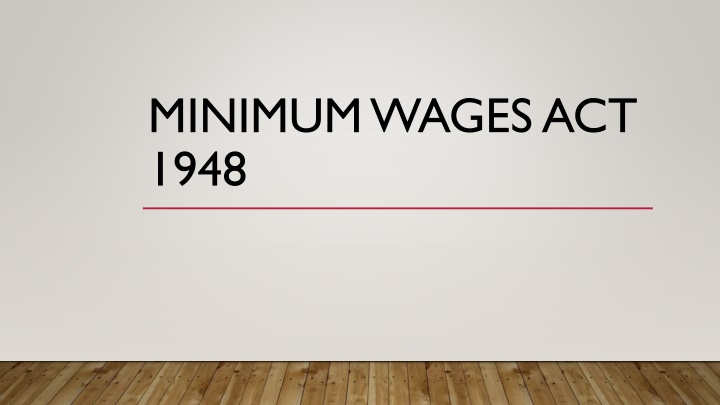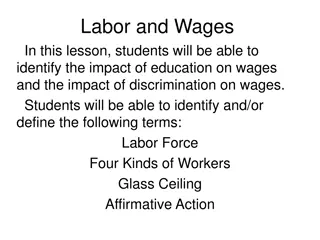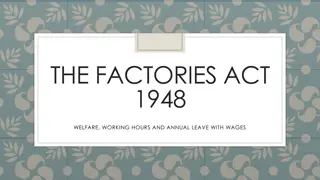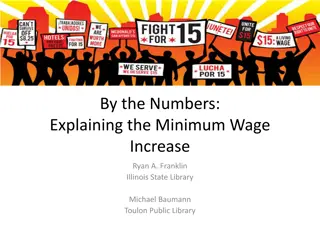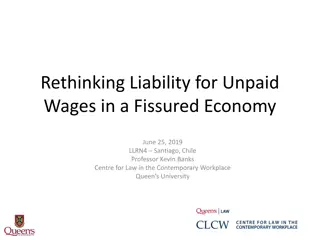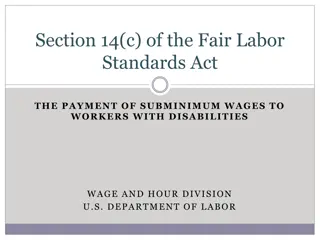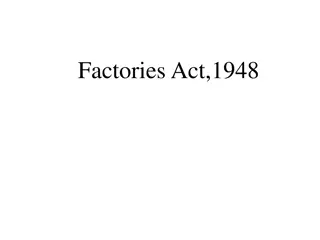Overview of Minimum Wages Act 1948 for Unorganized Workers
The Minimum Wages Act 1948 aims to protect the welfare of unorganized workers by setting minimum wage rates that ensure their subsistence and efficiency. The Act empowers the government to fix minimum wages in industries prone to exploitation. It includes provisions for fixing rates, procedure for revision, and recommendations for different worker classes. Committees are formed to gather input before finalizing wage rates.
Download Presentation

Please find below an Image/Link to download the presentation.
The content on the website is provided AS IS for your information and personal use only. It may not be sold, licensed, or shared on other websites without obtaining consent from the author.If you encounter any issues during the download, it is possible that the publisher has removed the file from their server.
You are allowed to download the files provided on this website for personal or commercial use, subject to the condition that they are used lawfully. All files are the property of their respective owners.
The content on the website is provided AS IS for your information and personal use only. It may not be sold, licensed, or shared on other websites without obtaining consent from the author.
E N D
Presentation Transcript
MINIMUM WAGES ACT 1948
INTRODUCTION The minimum wages Act 1948, was to secure the welfare of unorganised workers in certain industries by fixing the minimum rates of wages. The Act contemplates that minimum wages rates must ensure for him not only his subsistence and that of his family but also preserve his efficiency as a workman.The Act empowers the appropriate Government for fixation of minimum wages in employments enumerated in the schedule to the Act. The fixation of minimum wages relates to the industries where sweated labour is most prevalent or where there is inevitable chance of exploitation. In prescribing the minimum wages rates, the capacity of the employers need to be considered as the State assumes that every employer must pay the minimum wages if he employs labour.
SECTION 3 FIXING OF MINIMUM RATE OF WAGES The minimum wages Act 1948, was to secure the welfare of unorganised workers in certain industries by fixing the minimum rates of wages. The Act contemplates that minimum wages rates must ensure for him not only his subsistence and that of his family but also preserve his efficiency as a workman. The Act empowers the appropriate Government for fixation of minimum wages in employments enumerated in the schedule to the Act. The fixation of minimum wages relates to the industries where sweated labour is most prevalent or where there is inevitable chance of exploitation. In prescribing the minimum wages rates, the capacity of the employers need to be considered as the State assumes that every employer must pay the minimum wages if he employs labour.
SECTION 4 MINIMUM RATES OF WAGES Basic + Special Allowance (Which varies with the cost of living index). Basic + Cash value of concessional supply of materials like food, clothes, etc. An all inclusive rate which includes Basic + Cost of living Allowance + Cash value of concessional supply of materials.
SECTION 5 PROCEDURE FOR FIXATION AND REVISION OF MINIMUM RATES OF WAGES Publish its proposals in the official gazette asking comments from the affected parties. Constitute committees/sub committees for the purpose. The committees/sub-committees and advisory boards constituted by the Government consist of equal number of members of : . Employers Employees, and . Independent persons
FIXATION OF MINIMUM WAGES Recommendation of Advisory Board for different class [unskilled, skilled, Clerk, Supervisor] Publish recommendations in National Publications [for public comments/representations from Trade Unions etc.] Hearing of the Representatives Notification of Minimum wages
SECTION 7 ADVISORY BOARD Appointed by appropriate government. To co-ordinate the work of committees and sub committees appointed under Section 5. Advisory Board. For the purpose of co-ordinating the work of19[committees and sub- committees appointed under section 5] and advising the appropriate Government generally in the matter of fixing and revising minimum rates of wages, the appropriate Government shall appoint an Advisory Board.
SECTION 8 CENTRAL ADVISORY BOARD To advise the Central and State Governments in fixation and revision of minimum rates of wages. To co-ordinate the work of the Advisory Boards. For the purpose of advising the Central and[State Governments] in the matters of the fixation and revision of minimum rates of wages and other matters under this Act and for co-ordinating the work of the Advisory Board, the Central Government shall appoint a Central Advisory Board.
SECTION 9 COMPOSITION OF COMMITTEES Each of the committee, sub-committee and the Advisory Board shall consist of:. 1. persons to be nominated by the appropriate Government. 2. representing the employers and employees in the scheduled employments who shall be equal in number and 3. independent persons not exceeding one-third of its total number of members: one of such independent persons shall be appointed the Chairman by the appropriate Government.
SECTION 10 CORRECTION OF ERRORS The appropriate Government may, at any time, by notification in the Official Gazette, correct clerical or arithmetical mistakes in any order fixing or revising minimum rates of wages under this Act, or errors arising therein from any accidental slip or omission. Every such notification shall, as soon as may be after it is issued, be placed before the Advisory Board for information.
SECTION 11 WAGES IN KIND Minimum wages shall be paid in cash. The appropriate govt. may authorize, where there has been a custom of payment in this manner, payment of minimum wages either wholly or partly in kind. The appropriate govt. may authorize supply of essential commodities at concessional rates.
SECTION 12 PAYMENT OF MINIMUM RATE OF WAGES The Minimum Wages has to be paid without any deductions other than Statutory Deductions. Payment of wages less than minimum wages on the ground of less performance or output is illegal. Where in respect of any scheduled employment a notification under section is in force, the employer shall pay to every employee engaged in a scheduled employment under him wages at a rate not less than the minimum rate of wages fixed by such notification for that class of employees in that employment without any deductions except as may be authorised within such time and subject to such conditions as may be prescribed.
SECTION 13 FIXING HOURS OF WORK For an Adult Worker working in Factories: Number of Working Hours should not exceed 48 Hours in a week with a weekly Holiday. The Daily Hours should not exceed more than 9 Hours with 1 Hour Rest Interval. Provision of Compensatory Holiday/Overtime Wages if working on holiday.
SECTION 14 OVERTIMEWAGES If the person has worked for more than 48 hours in a week then, the excess hours worked will be treated as Overtime. Overtime wage rate will be twice of the normal wage Where an employee, whose minimum rate of wages is fixed under this Act by the hour, by the day or by such a longer wage-period as may be prescribed, works on any day in excess of the number of hours constituting a normal working day, the employer shall pay him for every hour or for part of an hour so worked in excess at the overtime rate fixed under this Act or under any law of the appropriate Government for the time being in force, whichever is higher.
SECTION 15 WAGES OF WORKER WHO WORKS FOR LESS THAN NORMAL WORKING DAY. Wages of worker who works for less than normal working day. If an employee whose minimum rate of wages has been fixed under this Act by the day works on any day on which he was employed for a period of less than the requisite number of hours constituting a normal working day, he shall, save as otherwise hereinafter provided, be entitled to receive wages in respect of work done by him on that day as if he had worked for a full normal working day: Provided, however, that he shall not be entitled to receive wages for a full normal working day (i) in any case where his failure to work is caused by his unwillingness to work and not by the omission of the employer to provide him with work, and (ii) in such other cases and circumstances as may be prescribed.
SECTION 16 WAGES FOR TWO OR MORE CLASSES OF WORK Wages for two or more classes of work. Where an employee does two or more classes of work to each of which a different minimum rate of wages is applicable, the employer shall pay to such employee in respect of the time respectively occupied in each such class of work, wages at not less than the minimum rate in force in respect of each such class. State Amendment Madhya Pradesh. In section 16, for the words "in respect of the time respectively occupied in each such class of work, wages at not less than the minimum rate in force in respect of each such class", substitute the words wages at the highest of the rates prescribed for such class.
SECTION 17 MINIMUM TIME RATE WAGES FOR PIECE WORK Minimum time rate wages for piece work. for which minimum time rate and not a minimum piece rate has been fixed under this Act, the employer shall pay to such employee wages at not less than the minimum time rate. Where an employee is employed on piece work
SECTION 19 INSPECTORS The appropriate Government may, by notification in the Official Gazette, appoint such persons as it thinks fit to be Inspectors for the purposes of this Act and define the local limits within which they shall exercise their functions. Subject to any rules made in this behalf, an Inspector may, within the local limits for which he is appointed
SECTION 20 CLAIMS A Labour Commissioner or any other appointed authority is authorized to hear claims regarding non-payment of minimum wages Any aggrieved person may apply to the authority for settling his claims within 6 months The appropriate Government may, by notification in the Official Gazette, appoint[any Commissioner for Workmen's Compensation or any officer of the Central Government exercising functions as a Labour Commissioner for any region, or any officer of the State Government not below the rank of Labour Commissioner or any] other officer with experience as a Judge of a Civil Court or as a stipendiary Magistrate to be the authority to hear and decide for any specified area all claims arising out of payment of less than the minimum rates of wages
SECTION 21 SINGLE APPLICATION IN RESPECT OF A NUMBER OF EMPLOYEES. Subject to such rules as may be prescribed, a single application may be presented under section 20 on behalf or in respect of any number of employees employed in SCHEDULEd employment in respect of which minimum rates of wages have been fixed and in such cases the maximum compensation which may be awarded under sub-section (3) of section 20 shall not exceed ten times the aggregate amount of such excess35[or ten rupees per head, as the case may be]. The Authority may deal with any number of separate pending applications presented under section 20 in respect of employees in SCHEDULEd employments in respect of which minimum rates of wages have been fixed, as a single application presented under sub-section (1) of this section and the provisions of that sub-section shall apply accordingly. State Amendments Section 21A
SECTION 22 PENALTIES Payment of less than Minimum Wages to employee Imprisonment which may extend up to 6 Months or Fine which may extend up to Rs 500/- or Both
